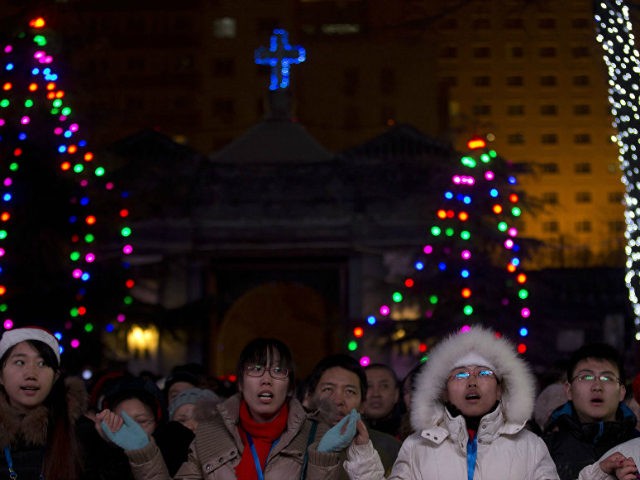The Chinese city of Langfang near Beijing banned any public displays celebrating Christmas, including Christmas trees, lights, banners, and any “religious activities” in public in an attempt to win a Communist Party award for being “civilized,” state media reported on Monday.
The Chinese Communist Party has spent years attempting to dissuade the population from engaging in Christmas festivities, even more secular ones like displaying Christmas trees and exchanging gifts. The Communist Youth League has taken a particularly strident stance on Christmas, calling it “China’s day of shame” in propaganda messages last year and filling campuses with banners urging young Chinese people not to partake in celebrations.
The Global Times, a state newspaper, announced the decision of the Langfang government as an attempt to maintain a “clean environment,” suggesting that celebrating Christmas makes the city unclean. Citing the city’s Urban Management Bureau, the newspaper noted that businesses and residences face government retribution, without specifying in what form, if they “put up posters, banners or light boxes about Christmas sales.” The city has banned Christmas trees in any form and warned that police will work extra hours on Christmas Eve and Christmas Day to keep street vendors from selling Christmas merchandise.
“City peddlers are forbidden from selling Christmas related items like Christmas apples [a common Chinese Christmas item], Santa costumes and stockings, or Christmas trees,” the Times warned.
The prohibition is not limited to material objects celebrating Christmas. “Outdoor performances to celebrate the holiday or promote sales are also prohibited,” the newspaper reported, as well as any overt religious worship in public. The city’s officials urge all local residents to “report” any public activity that appears religious in nature.
Langfang is reportedly attempting to win China’s “National Civilized City” award by enforcing its ban on Christmas, which the Global Times called the “highest honor to a city as it has strict standards in a variety of aspects, including the city’s social development, economy, infrastructure construction and public services.”
Christmas celebrations have grown increasingly popular in cities like Shanghai, which attract many Western travelers and businesses – often to the dismay of the Communist Party. The Global Times referred to Christmas displays in an article last year as “cultural invasion” and quoted an expert protesting that those in the West who object to the bans on religious celebrations do not “understand the inclusiveness and flexibility of Chinese culture.”
Pandaily, a China-based tech website, published a post this weekend explaining that China was increasingly “vulnerable to the widespread Western cultural imperialism” and thus more vigilant against Christmas.
“There is a psychological tug-of-war between Chinese people’s reverence for their culture versus their aspirations of modernity — which is unfortunately equated with Westernization,” the article reads, claiming Santa Claus is derivative of a Dutch tradition featuring “an incredibly offensive and racist character.”
The Communist Youth League’s campaign against Christmas last year was among the loudest in the country. In a message on Chinese social media, the youth league called Christmas “China’s Day of Shame” and called on young people to “resist the rampant Western festival.” The league posted banners throughout campuses reading “Strive to be outstanding sons and daughters of China, oppose kitsch Western holidays.”
These displays became increasingly popular under Communist Party leader Xi Jinping, who took over the country in 2013. A year later, regional departments of education began warning Chinese people to avoid “kitsch” Christmas traditions.
While most Chinese who partake in Christmas celebrations and decorating do so without strong attachments to the religious implication of the holiday, Xi has also implemented measures to curb the popularity of Christianity itself at a time in which China is on the verge of becoming the world’s most populous Christian nation. In anticipation of the Christmas holiday, Chinese police arrested nearly 100 people at one of the nation’s most popular non-governmental Christian churches, the Early Rain Protestant Church, this month. Among those detained were Pastor Wang Yi and his wife, who led the congregation. The government also shut down the social media accounts of all the church’s members to prevent both discussions of the raid on the church and of Christianity generally.
“The police said our church is an illegal organization and we cannot attend any more gatherings from now on,” one member of the church, after being released, told media. Xi has more strictly enforced the ban of illegal churches than his predecessors; only the “Chinese Patriotic Church” and the Chinese Catholic Church, which is not controlled by the Vatican, are legal Christian institutions.

COMMENTS
Please let us know if you're having issues with commenting.